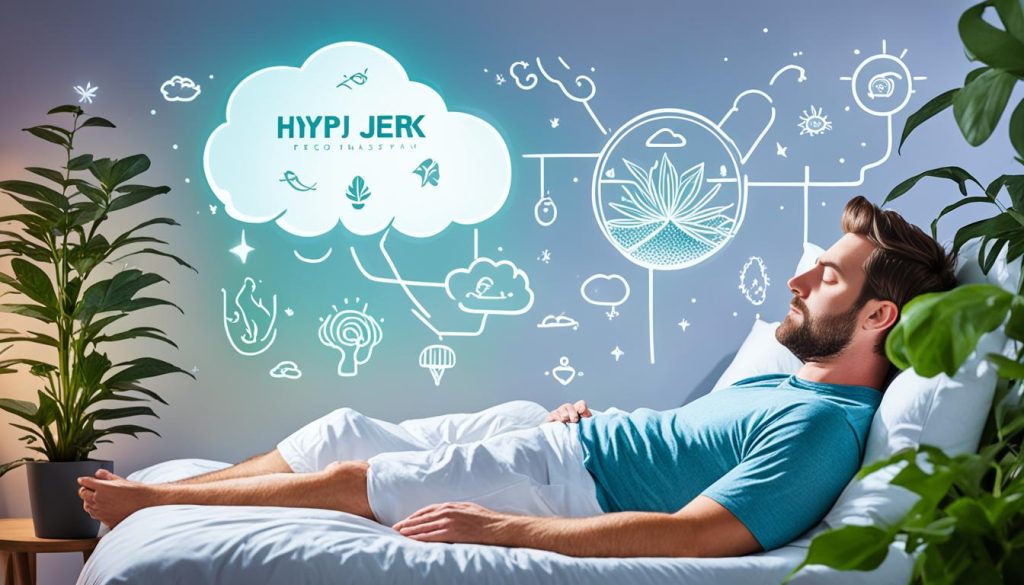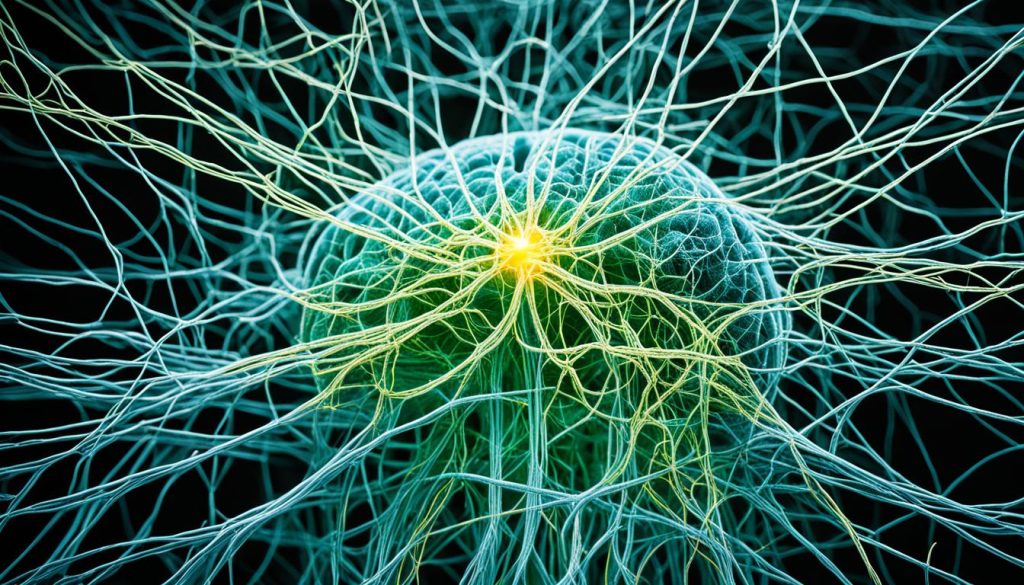If you’ve ever experienced your body jerking at random times while you’re trying to sleep, you’re not alone. These involuntary muscle jerks, known as hypnic jerks or sleep starts, can be quite startling. But what causes them? And should you be concerned? In this article, we’ll explore the phenomenon of body jerking at night and provide insights into its causes and effects on your sleep.
Why Does My Body Jerk at Random Times at Night?
Have you ever experienced those sudden muscle contractions just as you’re about to fall asleep? These are known as hypnic jerks or sleep starts. They can feel like abrupt jerking, shaking, or spasms in your body, ranging from mild twitches to more intense movements that may even jolt you awake. Hypnic jerks often occur in one side of the body and can vary in intensity from person to person.
Along with the physical jerks, you may also experience other sensations or mental imagery. Some people report feeling like they’re falling or seeing flashing lights. These sensations can accompany the muscle movements during hypnic jerks, making the experience even more vivid and unforgettable. While hypnic jerks are generally painless, some individuals may occasionally feel a tingling or painful sensation.

| Characteristics of Hypnic Jerks | What They Feel Like |
|---|---|
| Movement Intensity | Mild twitches to stronger spasms |
| Accompanying Sensations | Feeling like you’re falling or seeing flashing lights |
| Pain Level | Generally painless, but some individuals may experience tingling or mild pain |
Understanding what hypnic jerks feel like can help you identify and differentiate them from other sleep-related movements. While they can be surprising or disruptive, they are generally a harmless part of the falling asleep process.
Are Hypnic Jerks Normal? Should I be Concerned?
Hypnic jerks are a normal part of the sleep experience and are typically not a cause for concern. Up to 70% of people may experience hypnic jerks at some point. While they can be unsettling and disrupt sleep, hypnic jerks are considered harmless. In rare cases, a particularly violent jerk could lead to a minor injury, but this is not common. It’s important to distinguish hypnic jerks from other movements that can occur while awake or sleeping, as they occur specifically during the transition from wakefulness to sleep and are generally considered normal.
How To Stop Hypnic Jerks?
While it may not be possible to completely eliminate hypnic jerks, there are strategies that can help reduce their frequency and intensity. By implementing the following techniques, you can improve your sleep quality and minimize the disruptive effects of hypnic jerks:
- Establish a consistent sleep schedule: Go to bed and wake up at the same time every day to regulate your body’s internal clock and promote a more restful sleep.
- Create a calming bedtime routine: Engage in relaxing activities before bed, such as taking a warm bath, reading a book, or practicing deep breathing exercises. This can signal your body and mind that it’s time to unwind and prepare for sleep.
- Set up a sleep-friendly environment: Keep your bedroom cool, dark, and quiet to create optimal conditions for sleep. Consider using earplugs, an eye mask, or white noise machines to block out any distractions that could trigger hypnic jerks.
- Limit caffeine consumption: Avoid consuming caffeine, such as coffee, tea, and energy drinks, in the late afternoon and evening. Caffeine can interfere with sleep and increase the likelihood of experiencing hypnic jerks.
- Manage stress: Practice stress-reducing techniques, such as meditation, yoga, or journaling, to calm your mind before bed. Stress can disrupt sleep and contribute to the occurrence of hypnic jerks.
- Avoid certain medications: Some medications, such as stimulants and antidepressants, can increase the frequency and intensity of hypnic jerks. Consult with your healthcare professional if you suspect that a medication is exacerbating your symptoms.
By implementing these strategies and making consistent efforts to improve your sleep hygiene, you can reduce the frequency and intensity of hypnic jerks, leading to a more peaceful and uninterrupted sleep experience. If your hypnic jerks significantly disrupt your sleep or are accompanied by other concerning symptoms, don’t hesitate to seek guidance from a healthcare professional.

Key Takeaways
Here are the key takeaways regarding hypnic jerks, muscle twitches while sleeping, and uncontrolled body movements at night:
- Hypnic jerks, also known as sleep starts, are sudden, involuntary muscle contractions that occur as you are falling asleep.
- They are a normal part of the sleep experience and are not usually a cause for concern.
- Factors like excessive caffeine consumption, vigorous exercise before sleep, emotional stress, and sleep deprivation can increase the likelihood of experiencing hypnic jerks.
- While it may not be possible to completely stop hypnic jerks, there are ways to reduce their frequency and intensity.
- Improving sleep hygiene, reducing stress, and avoiding certain triggers can help minimize hypnic jerks.
- If hypnic jerks significantly disrupt your sleep, it’s advisable to speak with a healthcare professional for guidance and support.
| Summary | Recommendations |
|---|---|
| Hypnic jerks are involuntary muscle contractions that occur while falling asleep. | Improve sleep hygiene and reduce stress |
| Excessive caffeine consumption and vigorous exercise before sleep can increase the likelihood of hypnic jerks. | Avoid consuming caffeine close to bedtime and refrain from vigorous exercise before sleep. |
| Hypnic jerks are usually harmless and a normal part of the sleep experience. | Emphasize that hypnic jerks are not a cause for concern. |
| Reducing stress and creating a sleep-friendly environment can help minimize hypnic jerks. | Utilize relaxation techniques and establish a calming bedtime routine. |
If you are experiencing disruptive muscle twitches while sleeping, practicing good sleep habits and seeking professional guidance can help improve your sleep quality and overall well-being.
What Are Myoclonus and Other Types of Jerks?
Myoclonus refers to quick, jerking movements that are involuntary and can’t be controlled. It encompasses a range of muscle twitches and spasms that can occur during wakefulness or sleep. One type of myoclonus is hypnic jerks, which specifically happen during the transition from wakefulness to sleep.
While hypnic jerks are a common form of myoclonus, there are other types that can occur in various situations. These involuntary muscle movements can manifest as hiccups, twitches associated with nervous system disorders, or jerks caused by metabolic conditions or reactions to medications.
It’s important to differentiate between the different types of jerks, as they can have varying underlying causes and implications. In some cases, myoclonus may be a symptom of an underlying medical condition that requires further evaluation and treatment.
If you experience muscle jerks or twitches during sleep or wakefulness, and they are accompanied by other symptoms such as weakness, numbness, or changes in consciousness, it’s important to seek medical attention for a proper diagnosis and appropriate management.

Understanding the Causes of Myoclonus
Myoclonus, characterized by sudden, involuntary muscle movements, can have various underlying causes. It can be classified into different types based on the specific factors contributing to the condition.
Physiological Myoclonus
Physiological myoclonus is a type that occurs in healthy individuals and is typically benign. It can manifest as hiccups, sleep starts, or shakes due to anxiety or exercise. Although this type of myoclonus is generally harmless and temporary, it can be bothersome.
Essential Myoclonus
Essential myoclonus is characterized by muscle jerks that occur without any underlying illness. This type of myoclonus can be hereditary, suggesting a genetic predisposition. While the exact cause of essential myoclonus remains unknown, it is believed to involve abnormalities in certain neurotransmitters in the brain.
Epileptic Myoclonus
Epileptic myoclonus is closely associated with epilepsy, a neurological disorder characterized by recurrent seizures. Epileptic myoclonus can manifest as sudden and brief muscle jerks that occur in conjunction with seizures. The abnormal electrical activity in the brain during a seizure can trigger these involuntary movements.
Symptomatic Myoclonus
Symptomatic myoclonus is the result of an underlying medical condition or external factors. It can be caused by various factors, including head or spinal cord injury, infection, metabolic disorders, and certain medication reactions. Identifying and addressing the underlying cause is essential in managing symptomatic myoclonus effectively.
Determining the specific cause of myoclonus is crucial for appropriate diagnosis and treatment. A comprehensive evaluation by a healthcare professional, including a detailed medical history, physical examination, and possibly additional diagnostic tests, may be necessary to identify the underlying cause.

| Type | Cause |
|---|---|
| Physiological Myoclonus | Healthy individuals, anxiety, exercise |
| Essential Myoclonus | No underlying illness, hereditary |
| Epileptic Myoclonus | Associated with epilepsy, abnormal brain activity during seizures |
| Symptomatic Myoclonus | Underlying medical conditions, injuries, infections, metabolic disorders, medication reactions |
Conclusion
In conclusion, hypnic jerks, also known as sleep starts, are common and generally harmless involuntary muscle contractions that occur as you fall asleep. While the exact cause of hypnic jerks is not fully understood, factors like caffeine consumption, exercise timing, stress, and sleep deprivation can increase their occurrence.
While it may not be possible to completely stop hypnic jerks, there are strategies you can implement to improve your sleep and reduce their frequency and intensity. It is important to focus on improving sleep hygiene, managing stress levels, and avoiding triggers like excessive caffeine consumption or vigorous exercise before sleep.
For individuals whose hypnic jerks significantly disrupt their sleep or are accompanied by other symptoms, it is advisable to consult with a healthcare professional. They can provide personalized advice and guidance tailored to your specific needs and situation. By implementing these strategies and seeking professional support if needed, you can work towards getting better sleep and minimizing the impact of hypnic jerks on your overall well-being.




